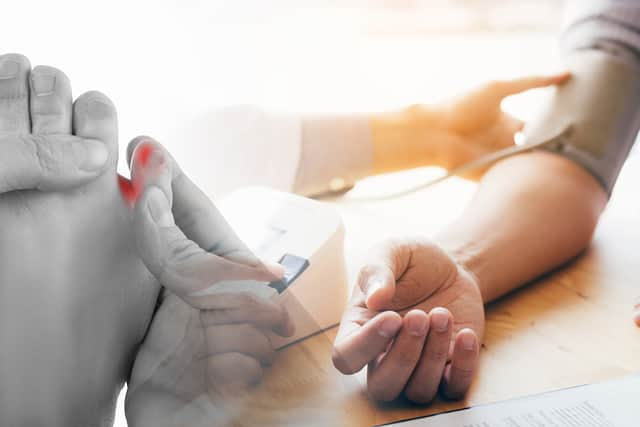High cholesterol: ‘smelly’ warning symptom linked to high levels, causes, and how to lower cholesterol
and live on Freeview channel 276
High cholesterol is often considered an ‘invisible killer’ as it typically does not cause symptoms, meaning it can be difficult to detect.
Those who have high cholesterol are at greater risk of heart problems and circulatory diseases, including heart attack, stroke and vascular dementia.
Advertisement
Hide AdAdvertisement
Hide AdIt can only be found from a blood test, but some bodily changes can be a warning sign that your cholesterol levels are too high.


What is high cholesterol?
Cholesterol is a fatty substance that is found in your blood that plays a vital role in how your body works. It is found in every cell in the body and is particularly important in the brain, nerves and skin.
High cholesterol is caused when the body has too much cholesterol in the blood. This is mainly a result of:
- eating fatty foods
- not exercising enough
- being overweight
- smoking
- drinking alcohol
Other factors that can cause high cholesterol levels that cannot be controlled include getting older, gender, ethinic background, an underactive thyroid gland, or it may run in your family.
Advertisement
Hide AdAdvertisement
Hide AdHaving too much cholesterol can block your blood vessels which increases the risk of having heart problems or a stroke.
Are there any warning symptoms of high cholesterol?
High cholesterol does not usually cause any symptoms, but research suggests it could be detected by unpleasant smells.
A study published in the journal Laryngoscope in 2020 suggests that phantom odour perception is associated with high cholesterol levels.
Phantom odour perception is when a person detects an unpleasant, bad, or burning smell when there is nothing there.
Advertisement
Hide AdAdvertisement
Hide AdResearchers collected data from the 2011 to 2014 National Health and Nutrition Examination Survey, yielding a nationally representative sample of 7,417 adults aged 40 years and above.
Participants reported on vascular conditions including history of stroke, and total cholesterol was also measured.
Findings showed that adults with diagnosed, but controlled, high cholesterol reported phantom odours more frequently than those without high cholesterol.
Stroke was also associated with a 76% greater likelihood of phantom odour perception, while congestive heart failure and angina were associated with three times and 2.8 times the odds of phantom odour perception among adults 40 to 59 years and 60 years and older, respectively.
Advertisement
Hide AdAdvertisement
Hide AdA threefold greater odds of phantom odour perception among adults aged 60 years and older with diabetes was also observed, but only among those who use both insulin and oral medications.
Researchers concluded: "Stroke, angina, congestive heart failure, well-managed high blood pressure, and well-managed high cholesterol are associated with phantom odour perception."
A doctor has also warned that the most obvious signs of high cholesterol follow on from peripheral arterial disease (PAD), which causes a build-up of fatty deposits in the arteries and restricts blood supply to leg muscles.
Doctor Sami Firoozi, consultant cardiologist at the Harley Street Clinic, part of HCA Healthcare UK, said a telltale sign of PAD can cause “smelly pus” to develop on your toes and lower limbs.
Advertisement
Hide AdAdvertisement
Hide AdDr Firoozi told The Express: “Although PAD is not immediately life-threatening, the process of atherosclerosis that causes it can sometimes lead to serious and fatal problems, such as critical limb ischaemia which occurs if the blood flow to the legs becomes severely restricted.
"The skin on your toes or lower limbs becomes cold and numb, turning red and then black, and/or beginning to swell and produce smelly pus, causing severe pain (gangrene)."
Other warning signs can include:
- severe burning pain in your legs and feet that continues even while resting
- skin turning pale, shiny, smooth and dry
- open sores on your feet and legs that do not heal
- loss of muscle mass in your legs
Dr Firoozi added: “In some cases, cholesterol can deposit around the eyes to form fatty, yellowish lumps.”
How to lower cholesterol
The NHS recommends making simple lifestyle changes to help lower your cholesterol levels. This includes:
Advertisement
Hide AdAdvertisement
Hide AdCutting down on fatty food
Eating less fatty food, particularly food that contains saturated fat, can help to lower your cholesterol to a healthy level.
Foods to cut down on include:
- meat pies, sausages and fatty meat
- butter, lard and ghee
- cream and hard cheese, like cheddar
- cakes and biscuits
- food that contains coconut oil or palm oil
Instead, try to eat more:
- oily fish, like mackerel and salmon
- brown rice, bread and pasta
- nuts and seeds
- fruits and vegetables
Do more exercise
You should aim to do at least 150 minutes (2.5 hours) of exercise per week. Swimming, cycling and walking are good options to start out with.
Stop smoking
Smoking can raise your cholesterol and make you more likely to have serious health problems, including heart attacks, strokes and cancer.
You can get help and support from your GP and the NHS Stop Smoking Service – your GP can refer you or you can ring the helpline on 0300 123 1044 (England only). The service can provide useful tips and advice about ways to stop cravings.
Advertisement
Hide AdAdvertisement
Hide AdCut down on alcohol
You should try to avoid drinking more than 14 units of alcohol per week, and have several drink-free days.
The NHS also recommends avoiding drinking lots of alcohol in a short time (binge drinking, and to ask your GP for help and advice if you are struggling to cut down.
Comment Guidelines
National World encourages reader discussion on our stories. User feedback, insights and back-and-forth exchanges add a rich layer of context to reporting. Please review our Community Guidelines before commenting.
